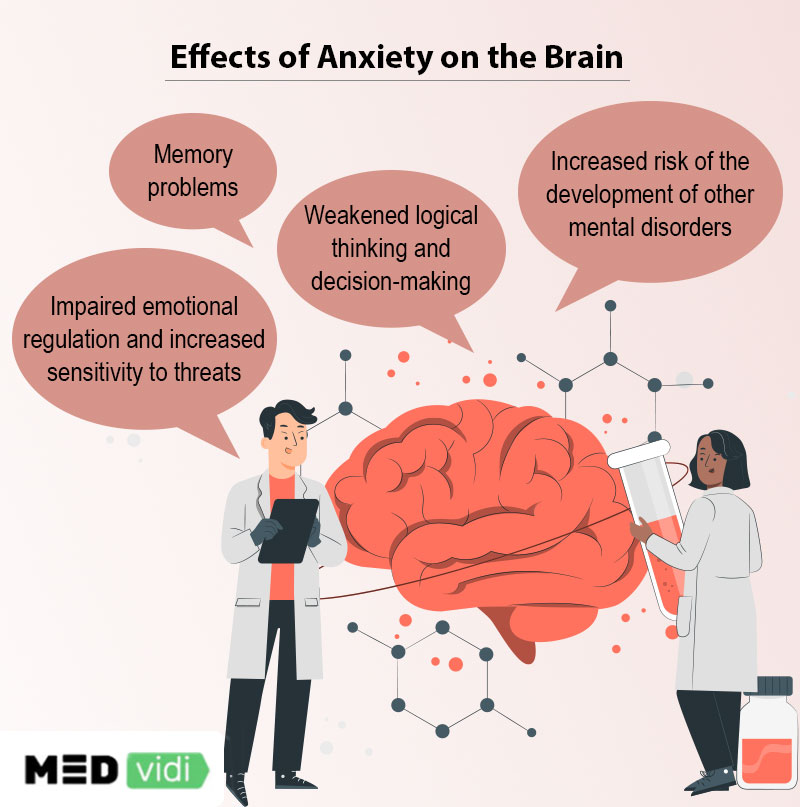Anxiety is one of the most common mental disorders, it affects more than
Although this disorder can significantly affect both the brain and body, the brain is particularly more vulnerable to the effects of anxiety due to its complexity and function. The disorder can cause changes in the way the brain works, resulting in a variety of symptoms that can impact overall mental health.
Anxiety can interfere with your daily life but it can be improved over time with treatment.
Changes in Brain Activity Under Anxiety
The brain is the center of all the body functions and actions with each part playing a specific role. For example, the limbic system is part of the brain that controls emotions, motivation, learning, and memory. It includes various brain structures such as the amygdala, hippocampus, thalamus, and other associated areas.
One of the main indications of anxiety is a diminished ability to regulate the emotional response to a threat. This may be due to an overactive amygdala or underactive hippocampus. Either of these results in increased sensitivity to threats with very little downregulation causing anxiety attacks.
Let MEDvidi therapists guide you through the path of calmness. Click for online anxiety treatment.
Impact of Long-term Anxiety on the Brain
Anxiety may impact various parts of the brain to different extents. These mostly include the prefrontal cortex, amygdala, hippocampus, and others. Let’s learn more about them and how they can be affected by chronic stress and anxiety.
Amygdala[3] is involved in the “bottom-up response.” It detects threats and generates emotions such as fear and anxiety, helps to learn the triggers of adverse events, and mediates stress and aggression. It is also involved in the formation of emotional memories which may influence how a person perceives certain events.
Amygdala may grow and intensify the body’s response to a threat even if it is a minor instance, overthinking, or anxiousness. An increase in amygdala volume promotes increased levels of the stress hormone cortisol. Normally its production is stopped once the threat passes but with chronic anxiety, it may continue.- The
prefrontal cortex[4] modulates cognitive control functions such as attention, impulse inhibition, decision-making, and interpretation of complex social interactions. Chronic anxiety may cause cellular degeneration in the prefrontal cortex which affects logical thinking and decision-making. It may also increase the risk of the development of other mental disorders such as depression and PTSD. Hippocampus[5] is a brain structure mainly involved in the formation of memories, thinking, and emotional regulation. It is a vulnerable structure, so damage may cause loss of memory. The hippocampus and prefrontal lobe are a part of the “top-down process.” They downregulate the actions of the amygdala by investigating the threat and suppressing autonomic and emotional processes which may not be appropriate for the situation.
If affected by chronic anxiety, the hippocampus may get damaged, shrink, and decrease neuronal regeneration. It may result in cognitive deterioration and disruption in serotonin activity. It also compromises memory (which may lead to dementia or anxiety memories) and increases the risk of the development of schizophrenia and Alzheimer’s.

Anxiety Management
The damage caused to the brain by anxiety is reversible. Anxiety can be managed, so it is important to consult a doctor when you experience symptoms to avoid further harm. Depending on the severity of the condition your doctor may either suggest therapy or prescription medicines:
- Prescription medicines. Various anti-anxiety drugs and antidepressants help with improving brain damage through different mechanisms.
- Non-pharmacological interventions. Cognitive behavioral therapy and physical activity have both been found useful.
To schedule an appointment for professional help, click the button below.
Conclusion
Anxiety can have significant impacts on the brain and overall cognitive functioning. It may even cause long-term structural changes in certain areas of the brain. However, the positive is that anxiety can be managed with the help of therapy and medication, allowing individuals to improve their mental health and overall well-being. It’s important for those experiencing anxiety to seek professional help. Remember, taking care of your mental health is just as important as taking care of your physical health. Contact MEDvidi, and we will help you to develop effective strategies for coping and reclaiming control of your life.












